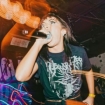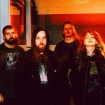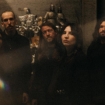Following 10-hour shifts at their day jobs, Heriot's four members made the anxiety-inducing trip to band practice each night — a two-hour drive for one of them — knowing full well they could be arrested for it. Left in the middle of a pandemic with songs so good they couldn't remain unrecorded, the band ignored the British government's demand to stay inside, breaking the law for the sake of their music. The rewards of their risk-taking? Five singles that shudder with nervous angst.
"Heriot isn't for the faint-hearted" the up-and-coming band advised in a press statement for one of said songs, and they weren't kidding. Originally a three-piece made up of Swindon-based schoolmates Erhan Alman (guitar), Jake Packer (bass, vocals) and Julian Gage (drums), before they were joined in 2020 by Birmingham's Debbie Gough (guitar, vocals), Heriot have made their name with a cauterizing blend of industrial, sludge, death and doom metal. They debuted "Cleansed Existence," their first track as a four-piece, towards the end of 2020. They've since followed the song up with six more singles (including a crushing cover of Machine Head's "Ten Ton Hammer"), earned endorsements from scene leaders, including Lamb of God's Mark Morton, and signed to the U.K.'s trusty Church Road Records. "I don't think we expected it to go as well as it has gone," Gough tells Revolver.
Just as the quartet put forth a singular mix of sub-genres, Heriot may also be one of the first bands to join Swindon and Birmingham together, two U.K. cities that couldn't be more different. "I remember the first time we walked Deb around the town center," recalls Gage. "We did one lap of the square and I said, 'That's it, that's all there is.' ... Deb was very surprised."
While Birmingham, the industrial West Midlands city famously considered the birthplace of metal, provided Gough with a plethora of musical opportunities growing up, the boys' hometown of Swindon remains relatively sceneless. Gage, Alman and Packer's musical upbringing, therefore, was far more insular and atomized than Gough's. "When we were 14 and 15, we used to get some deathcore bands, but that was about it," says Gage. "There aren't too many bands around here anymore that aren't cover bands, and even then, they don't really play here."
Gage was the first among the band's Swindon-based members to develop a taste for heavy music, picking up his first Slipknot CD at age 10. ("It wasn't just a phase!" he enthuses.) A preteen besotted with Joey Jordison's playing and stage stunts, Gage says that he was "very much outcast at the time.'' That was until he found fellow metal devotees in Packer and Alman, whom he met at high school. The trio began forming their first bands right after turning teenagers and waited impatiently to come of drinking age so that they could play shows somewhere in Swindon's tiny city center. "But by the time we were old enough to go to those venues, they'd stopped putting on shows," Gage notes.
Meanwhile, Gough, a self-confessed "frustrated Brummie" who considers Birmingham "the best place in the world," got to experience the city's live scene from age four onward, as her father showed her the ropes of the roadie lifestyle while raising her on a healthy diet of Black Sabbath, Metallica and Judas Priest.
Despite their radically different upbringings, a common thread binds each member of Heriot: They're all students of YouTube. "None of us are trained," Gage explains. "I think I did about 10 drum lessons as a kid, and that was it. I know nothing about my instrument." This means that, today, rather than speaking to each other in the language of notes and chords, they simply let their instruments speak for themselves. Don't even bother trying to get them to play a scale. "I work in a guitar shop, and one of the guys was playing a song by Lizzo," Gough recalls. "I won't quote the exact chord, but it had something like a C#7, and I thought, I don't know it, I literally can't play it, and he was like, 'How can you not play it?' But I just really don't know any guitar common sense."
Each equipped with their own intuitive playing style, neither Heriot nor Dead Hands, Gough's former band, quite fit into the hardcore lineups they were lumped in with while trying to make their mark on the U.K.'s live music scene. "In my old band, we always had Chariot and Dillinger Escape Plan in our heads," says Gough. "We were never gonna fit in a hardcore bill." Meanwhile, Heriot were usually placed alongside beatdown bands. "I'm not saying they all sound the same," Alman adds, "but we definitely stood out amongst them."
Naturally, with their sui generis sounds, as well as their mutual penchant for nasty HM-2 tones, Heriot and Dead Hands bonded. "We started talking, hanging out and playing gigs together," Alman says. "And then, when Deb's band dissolved, she asked us to do a side project with her and we said, 'Nah, just join us.'"
However, with Gough living nearly 100 miles from her bandmates, this was easier said than done, leading to the aforementioned lockdown-defying drives to rehearsal, in the neutral location of Bristol. "I drive two hours to practice for three hours after work, and then I drive back home before getting back up for work again," Gough reports. "It's quite a big thing to put on yourself, but I don't know what I'd do if I wasn't doing this. I have no other interest in anything else. All I do is play guitar, go to shows and listen to bands."
Add "play shows" to that list: After releasing their singles during the pandemic to only an online response, Heriot have finally returned to the stage, bringing a near peerless level of energy and intensity to their sets. Often, the members aren't able to stand for half an hour after they perform. "I usually go too hard," concedes Gage.
"I think aggression is a given with the type of band we are, anyway," adds Gough. "This type of music is always confrontational, and there are certain things you think about in everyday life that makes you question, why is it like that? And also, I get mad anxiety when I set up at a show. Sometimes I can see people looking at me thinking, 'Oh, what's she gonna do?' And I love the first minute of being like, 'Fuck you, I can go as hard as everyone else.' That's where some of the aggression comes from. I hope that if you were doubting me, now you feel silly."












